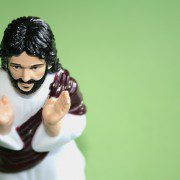ODJ: El-Shaddai
February 3, 2013
READ: Exodus 6:1-9
I am Yahweh—“the Lord.” . . . [I am] El-Shaddai—“God Almighty” (vv.2-3).
El Shaddai, a worship song written by Michael Card and John Thompson, features many Hebrew words in its lyrics. It won Song of the Year and Michael Card won Songwriter of the Year at the 1983 Gospel Music Association Dove Awards. The title of the song came from Genesis 17:1 and Exodus 6:3.
Refusing to free the Jews, the Pharaoh of Egypt challenged, “Who is the Lord?” (Exodus 5:1-2). God responded, revealed and reaffirmed His covenant identity: “I am Yahweh—‘the Lord.’ I appeared to Abraham, to Isaac and to Jacob as El-Shaddai—‘God Almighty’ ” (Exodus 6:2-3).
The four affirmations of God’s proper name, “YHWH”—transliterated “Yahweh” and rendered as “I am the Lord” (vv.2,6,7-8)—underscore His absolute sovereignty and authority. The seven “I will” statements affirm His faithful resolve to carry out His redemption plan: “I will free you . . . and will rescue you from your slavery. . . . I will redeem you . . . . I will claim you as My own people, and I will be your God. . . . I will bring you into the land . . . . I will give it to you as your very own possession” (vv.6-8).
Revealing Himself as “El-Shaddai—‘God Almighty’ ” (v.3), He wants us to know that He is the preexistent and self-existent, self-sufficient and all sufficient, all powerful and all bountiful YHWH! He wants us to know Him as our Deliverer (v.7).
The chorus of El-Shaddai states: “El-Shaddai, El-Shaddai (God Almighty), El-Elyon na Adonai (God Most High). Age to age You’re still the same, by the power of the name. El-Shaddai, El-Shaddai, erkamka na Adonai. I will praise You till I die. El-Shaddai.”
Erkamka na Adonai (based on the Hebrew words of Psalm 18:1) is our rightful response: It means, “I love you, Lord.” —K.T. Sim
| 365-day plan› Exodus 4:1-17
Read Genesis 17:1, 28:3, 35:11, 43:14, 48:3 to see how God reveals Himself as “El-Shaddai.” What do these passages teach you about God?
The Jews didn’t believe God was El-Shaddai because “they had become too discouraged by the brutality of their slavery” (Exodus 6:9). How does life’s pain cause us to doubt God’s power and goodness? How should we respond to God?









